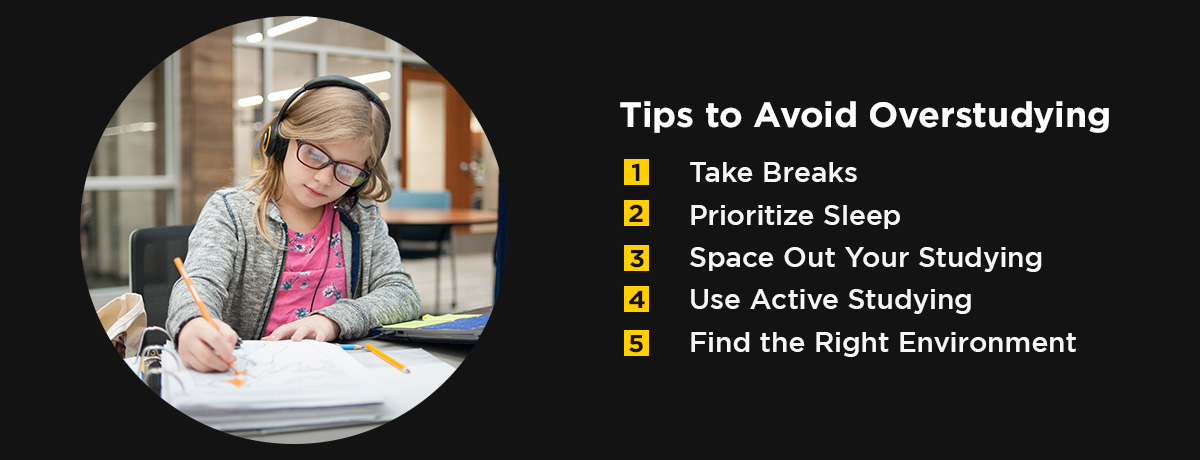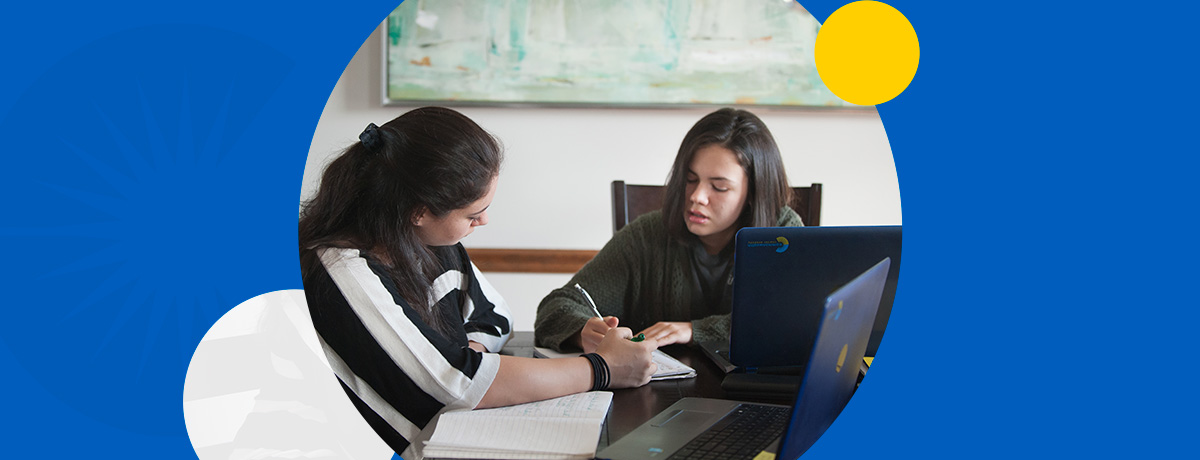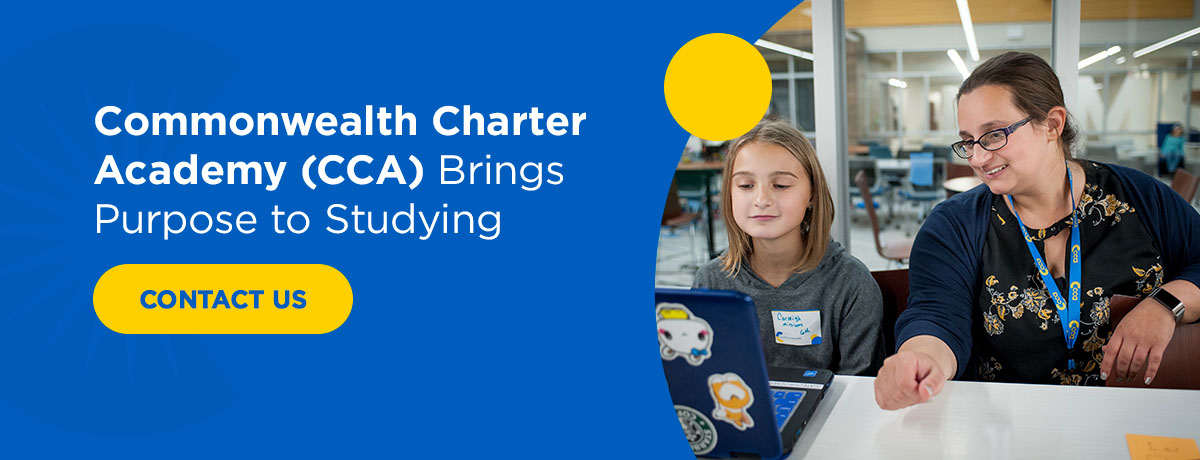Every school year, countless students try to cram weeks’ worth of content into a single night of studying. Others spend too much time studying throughout the year, which draws them away from social opportunities, hobbies, and other activities that are essential for their development. Neither of these strategies is ideal, and they can actually hurt the child’s efforts in class.
Overstudying is a common problem for students, especially in the older grades, but it isn’t always easy to spot. After all, the definition of “too much” can vary greatly from student to student and class to class. Let’s explore overstudying and how you can help your child build healthy study habits for life.
What Is Overstudying and Why Does It Happen?
Overstudying refers to studying too much, to the point where it is no longer helpful. It may even be harmful to a student’s learning. If you’ve ever tried to study or work for hours on end, you’ve probably noticed that feeling of burnout that eventually sets in. You might start to feel tired, easily distracted, and irritable. After a certain period, studying can become less effective. You could be less productive and hurt your ability to process and retain the information.
Hustle culture is partially to blame for a student’s tendency to overstudy. The hustle culture mentality tends to appear when we overemphasize high scores and grades and promote a nonstop work ethic. For example, if a student is told that the only way they’ll get into their dream school is by studying as much as possible, they might overstudy.
How Much Studying Is Too Much?
This question has no clear answer because study time looks different for everyone. Students might need to study more or less for specific classes, too. Some kids may need to study more for their science, technology, engineering, and mathematics (STEM) subjects, while others will need to dedicate more time to the humanities courses. Additionally, some teachers assign more work than others. However long it takes, kids shouldn’t spend more than half of their free time studying.
Instead of trying to find a magic number of hours per week to study, consider the effects of your student’s study time. Do they finish feeling confident and knowledgeable, or are they exhausted and nervous about their test?
Some symptoms of overstudying include the following:
- Sleep problems
- Less socialization, such as spending time with friends and family
- Less time spent on interests and hobbies
- Increased anxiety or depression
- Physical symptoms like headaches and stomachaches
- Physical and mental exhaustion
If your student spends a lot of time studying and exhibits any of these problems, overstudying could be the culprit.
The Negative Effects of Overstudying
Overstudying may not seem like a problem initially, but the negative impacts are wide-reaching. It can affect the student’s:
- Confidence: If a student spends hours upon hours studying but doesn’t see the results they’re hoping for, the experience will likely take a toll. While overstudying is sometimes effective, it can also encourage students to work long hours to prove their knowledge and feel validated in class.
- Study efficacy: Studying past a certain point can make it harder to focus on, retain, or recall information. Instead of improving understanding, it can make things harder, contributing to student anxieties.
- Personal and social activities: Too much studying doesn’t leave much room for personal hobbies or social activities, such as playing with friends and spending time with family.
- Perfectionism: Mistakes are a part of life, but perfectionism can cause students to respond to mistakes in unhealthy ways. Overstudying often goes hand in hand with perfectionism, which encourages students to expect nothing short of perfect scores in their studies. Perfectionism increases stress, and researchers have even connected excessive studying with obsessive-compulsive disorder (OCD) and found that worry is its strongest predictor.

Tips to Avoid Overstudying
Studying smarter is one of those skills that most students have to work toward. It may not come naturally, so you can support your young learner by helping them hone their study skills. Here are some tips to promote a healthy level of studying.
1. Take Breaks
For many students, breaks feel unproductive, but research shows that breaks are necessary for helping our brains work better. It can reduce stress levels, help us focus, and improve recall. Encourage breaks that nourish the body and mind, foster creativity, or involve movement or socialization.
2. Prioritize Sleep
Don’t let studying cut into your learner’s sleep. Kids aged 6-12 need 9-12 hours of sleep each night, while teens aged 13-18 need about 8-10 hours. Sleep is crucial for helping us process information and commit it to memory, so ensure kids get enough.
3. Space Out Your Studying
Students should space out their studying instead of relying on a night of cramming. Piling weeks of material into one night makes overstudying much more likely. Instead, have them tackle their studies a little bit at a time, reviewing notes and resources daily. Tackling their studies a little bit at a time will also help students avoid procrastination.
4. Use Active Studying
While studying, most students will use passive or active strategies to learn. Passive strategies involve consuming information, such as rereading notes or memorizing definitions. Active strategies involve engaging with the material. Students might explain a concept in their own words or develop a flow chart to connect information. Active techniques tend to be more efficient, so they can help your child study more productively.
5. Find the Right Environment
Help your student find the ideal setting for learning. Some kids will work better in silence, while others like a little background noise. They might prefer working at night or in the morning. Experiment to see what works best. If electronics are a problem, try having your student leave their phone or laptop in the other room.
What Is the Pomodoro Technique?
One beloved study tactic is the Pomodoro technique. Here’s how this simple yet effective strategy works:
- Outline the tasks you need to complete, and decide how much time you’ll need to finish them.
- Open up a time-tracking app like a stopwatch or a dedicated Pomodoro timer website.
- Set a timer for 25 minutes, and focus on a single task until the timer ends.
- After your 25 minutes, take a five-minute break. The 25-minute work session and the short break are collectively called a Pomodoro. Reset your timer and do another Pomodoro.
- After four Pomodoros, take a longer break for about 15-30 minutes.
The Pomodoro technique can help create a sense of urgency without unnecessary stress. Try not to break each Pomodoro. If a task is too big, break it down into smaller steps.
The Benefits of Good Study Habits
Good study habits go far beyond preparing for exams and assessments. It can help students with the following:
- Time management skills: A major part of effective studying is time management, and students will use that skill throughout their lives. They’ll need it in the workforce, while pursuing higher education, and throughout daily life.
- Confidence: Good study sessions can help students build confidence in a specific subject and in their overall education. When they avoid overstudying, kids can make the most of their learning and feel encouraged by their hard work.
- Retention: Of course, better studying can also help students improve their understanding of the topic at hand. They may perform better in school and take their knowledge beyond rote memorization.
- Better mental health: Overstudying can take a toll on a student’s sleep, social life, and stress levels, all of which impact mental health and well-being. Strong study habits can help encourage better mental health.
Good studying doesn’t happen by accident. To achieve these benefits, caretakers and educators must be purposeful and proactive.
Commonwealth Charter Academy (CCA) Brings Purpose to Studying
At CCA, we focus on building these foundational study skills to help students learn in the way that works best for them. We know that every kid is unique, so we personalize learning to students’ unique styles, interests, goals, and strengths. For your child, that customization lends purpose and direction to the act of studying. They understand the material they’re learning in a certain way, which helps them approach studying with a positive mindset to make the most of it.
Reach out to us today to learn more about CCA’s wealth of resources that can help your child learn to study, or enroll today to get started!




